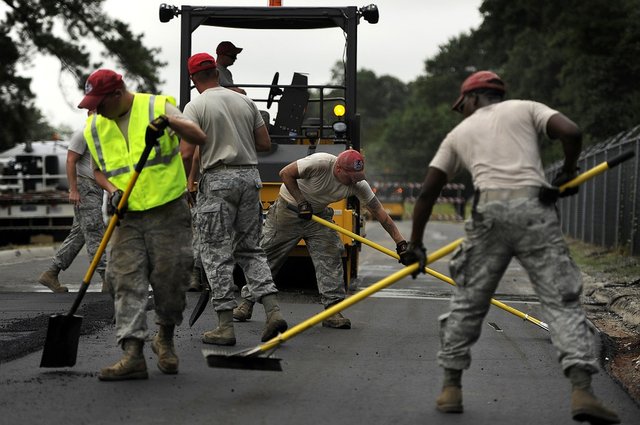Domino's fills in city potholes - Does this make your anarcho-capitalist friend smarter than you?
But who will maintain our roads?
The argument for libertarian, or more specifically anarcho-capitalism government (or... non-government I guess?) is intriguing. It's something I often think about. Raised in a conservative household, I've always been skeptical that such a system could actually work in practice, but I've always been intrigued by the arguments for it. I foresee myself taking a deeper dive into the merits and shortcomings of such a system, but until I've completed my research and properly educated myself on a wider array of issues I'll admit I'm still undecided on the best structure for the United States. That being said, I saw an article that made me think about one common counter argument to the idea of anarcho-capitalism. The argument is rooted in the idea of "who will maintain roads/infrastructure."
Domino's will apparently?
The article I found was about Domino's pizza, who as an advertising effort has decided to help fill in potholes in Milford, Delaware. I discovered this article when I was looking through the Washington Post opinion section for some softball articles I could easily dismantle from their horrifyingly short-sighted group of opinion writers. Before I could decide on an article to attack, I found the above article about Domino's and immediately thought of some conversations I've had about anarcho-capitalism and it's pros and cons in the last year. My initial position was similar to many people's, that you need government to build and maintain roads and other infrastructure. In those conversations I was presented the argument that actors within each community would be incentivized to build and maintain their own infrastructure at a lower cost and with more available capital by removing government as a middle man. Some of the examples they gave were that businesses would likely take a large role in making sure the community was desirable and therefore marketable and profitable for them, and part of that would be stepping up and taking a role in maintaining things like infrastructure. Not to mention, those businesses need both employees and customers to be able to get to and from their stores!
I was always intrigued by the idea, but I never felt certain that it could work (although I never wrote it off completely either). Now, about a year later from my first introduction to this philosophy, I'm seeing an article where a business is helping to take care of roads and has done so in the interest of their business and community. This is one of the exact issues I wasn't quite sold on from my introductory conversations on anarcho-capitalism with a good friend and it's happening right now for everyone to see. The idea that Domino's would do this isn't even the crazy part to me, the truly crazy part is that they're doing so under a non-anarcho-capitalist society. This is a singular business, spending money (in the hopes of a return due to the PR implications) while also paying taxes. They're essentially double-spending on the community by not only paying taxes but also providing this service of funding pothole maintenance, which is an indicator that where free markets exist the incentive to serve the community in order to expand said business is a real and tangible thing. This brings up some interesting things to consider.
What would the roads be like if all the businesses in Milford didn't have to pay any taxes?
Although I'm not yet sold on the idea that the anarcho-capitalist system could work fully implemented the idea is intriguing. I still have many questions about national security, crime, and interactions between non-like-minded communities within close proximity. Those questions all have a billion follow-up questions and I just don't know yet. That being said, this organizational effort for the community while also paying taxes makes one wonder what the organization could accomplish without taxes. If Domino's didn't have to pay taxes, what else could they offer? What if all the organizations in that community didn't have to pay taxes? Could they collectively create a seamless infrastructure, fixing issues as they come up every year from the seasonal damage of winter? Could they even collaborate and use their funds to hire some great scientific minds to come up with a better and more affordable solution to road building that would be less susceptible to such damage during the winter? Could communities like this all over the United States drive down the prices of services to maintain roads without government interference as a factor? It's hard not to admit that adding government into the equation creates a predictable and disappointing result. We joke in Nebraska that we have 2 seasons, winter and road construction season. I have a hard time imagining that Nebraska is alone in it's inefficiency to quickly and efficiently maintain roads after winter, many states have far more harsh winters than we do. It's also hard not to admit that private enterprise is insanely resourceful and efficient when not constrained by government. It really does seem plausible that something like infrastructure could be handled better by the private sector if not hindered by tax expenses and regulations.
Even without having a libertarian upbringing, simply being raised in a conservative (not big R Republican, fiscally conservative) household does instill the belief that problem + government = inefficient solution. My core beliefs have always revolved around limiting government so it's no surprise that I would find anarcho-capitalism to be intriguing. The reason that people that come from my camp don't seem to want to entirely let go of government is that we still feel that a constitutional republic of representatives elected by their people at the very least can set a standard set of rules that we all operate under and are decided by people that ultimately answer to their constituents. That same camp also recognizes that with that said system, those with other ideas can put forth some terrible policies and create some intricate and hard to repeal issues, but we tend to think that those sorts of policies ebb and flow. When people are doing well they think we should get the government more involved (and they're wrong but it happens) until things turn south and then we try and get representatives that will restrict government a bit. In essence, we accept an inferior product (government) simply because it works well enough and we can maintain our core freedoms through this system, at least to a higher degree than any other form of government that's successfully implemented in the world right now. Even knowing that the hypothetical level of freedom granted by anarcho-capitalism exceeds that of the constitutional republic we currently have, if we don't believe such a system could be successfully implemented we're happy to settle for the latter. It has it's faults but it truly isn't a bad system (looking at you communism/socialism/marxism). Settling is okay only when improvement is not possible, but what we sometimes forget is to continue evaluating if we could do better due to the complacency with where we're at. Which brings me to my primary point.
Modern fiscal conservatives should keep an eye on anarcho-capitalism
Let's say the United States is a giant beach. The anarcho-capitalists are in the water doing whatever they want and enjoying themselves, the far left/right leaning individuals are at separate picnic tables glaring, calling each other snowflakes, circle-jerking in their echo chambers, and being incapable of making/taking a good joke. Where are modern fiscal conservatives (and probably those who consider themselves classical liberals as well) in this illustration? Frankly, we're on the beach watching the fun the anarcho-capitalists are having, perhaps with our toes in the water. We don't know if there's sharks out there so we feel nice and safe with maybe just our feet in. If we are able to observe that there aren't sharks and the water is perfectly safe, does it not make sense to jump in and join the fun though? When someone has spent their life accepting that government is a necessary evil, but then sees something happen independent of government, it does make you question things again.
So, to tie everything together, I'm fully aware it's just one organization and a few potholes. I understand this is not a massive revolution and it will likely come and pass without going anywhere further. That being said, it's still notable. It's an indicator that a system that many of us have written off as "only theoretically doable" might not have to stay in the theoretical box we've put it in. It's easy to see that with increased capacity for humans to communicate clearly (TV, Radio, Phone, Internet, Blockchain) we do also develop the capacity to keep each other accountable. The transparency and record keeping of what every organization and individual is saying and doing without the need of government does lessen the extent to which we need government. If we know from social media and private investigation that Company A is dumping toxic waste into our town's river, we can stop buying things from Company A and move to Company B without the government needing to be involved, and it's a very arguable point that we have the capacity to make those decisions as a community without government now. So, my takeaway is that if you're in my boat, let's not discount the idea of anarcho-capitalism. Let's study it, question it, observe whatever instances of it's ideals exist in the real world, and keep an open mind to the idea. Albeit a small scale example, the Domino's example does at least indicate a possibility that those crazy bastards might just be right!



Curated for #informationwar (by @truthforce)
Our purpose is to encourage posts discussing Information War, Propaganda, Disinformation and other false narratives. We currently have over 7,500 Steem Power and 20+ people following the curation trail to support our mission.
Join our discord and chat with 150+ fellow Informationwar Activists.
Connect with fellow Informationwar writers in our Roll Call! InformationWar - Contributing Writers/Supporters: Roll Call Pt 8
Ways you can help the @informationwar